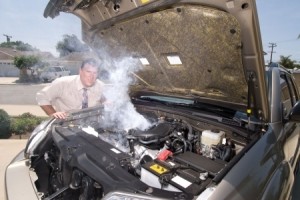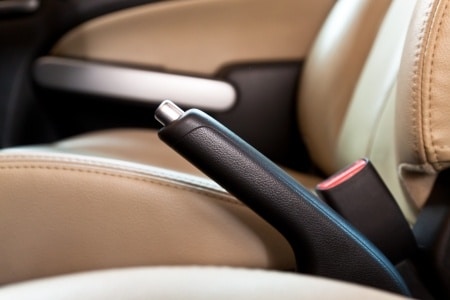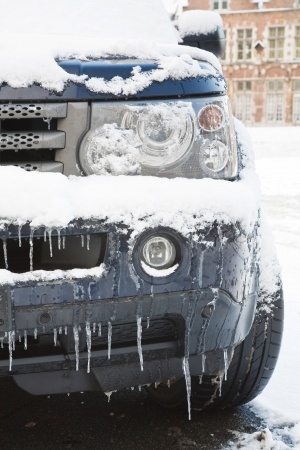What to do when your car overheats
Hot summer temperatures can cause your vehicle to overheat and don’t assume that new engine won’t spew out the steam while you’re on vacation. It can happen, particularly if you’re taking a trip over the Rockies on a 100-degree day. Here are a few pointers on what to do and not do if your car’s engine overheats.
 Turn off your air conditioner. If you notice your temperature gauge suddenly heading into the danger zone, immediately shut off the air conditioning and roll down your windows. Your vehicle’s AC puts a lot of strain on your engine. Doing so will help cool it down.
Turn on the heater. The heater in your car transfers heat from the engine, so cranking up the blower will vent excess heat away from your engine. (Of course, you’ll be a bit uncomfortable until you can reach a service station, but it beats being stranded.)
Pull over. Open the hood, and let your engine cool off. Every time your car overheats it causes damage to the engine. Give it a half-hour to cool down.
Once the engine has cooled off, check the coolant tank. The plastic coolant reservoir is located near the radiator. Check to see if there is coolant in the tank and if it is at the proper level indicated by marks in the tank. If you are out of coolant, it could mean you have a leak. Add water. This will dilute the anti-freeze but should buy you enough time to reach a service station.
Don’t open your radiator cap until the engine has cooled down. Doing so could unleash a geyser of hot steam and radiator fluid that can cause serious burns. Place a cloth over the radiator cap to protect your hand and tilt the cap away from you.
Do not put cold water into a very hot radiator. Doing so can cause the engine block to crack. Still, it’s always a good idea to keep a supply of water in your car as well as a jug of antifreeze. Once your engine cools off and it is safe to remove the cap, check the level of coolant. Add a 50-50 mixture of water and antifreeze to fill the radiator. If you open the cap and find out that your radiator is empty, you might want to call a tow truck rather than restart your vehicle.
Overheating can occur for a number of reasons. A leaky radiator, lack of coolant or blocked hose or even a faulty thermostat — those are the most common culprits. Have your vehicle examined to ensure there is no major problem with the engine, as an ounce of prevention surely beats costly repairs.
Turn off your air conditioner. If you notice your temperature gauge suddenly heading into the danger zone, immediately shut off the air conditioning and roll down your windows. Your vehicle’s AC puts a lot of strain on your engine. Doing so will help cool it down.
Turn on the heater. The heater in your car transfers heat from the engine, so cranking up the blower will vent excess heat away from your engine. (Of course, you’ll be a bit uncomfortable until you can reach a service station, but it beats being stranded.)
Pull over. Open the hood, and let your engine cool off. Every time your car overheats it causes damage to the engine. Give it a half-hour to cool down.
Once the engine has cooled off, check the coolant tank. The plastic coolant reservoir is located near the radiator. Check to see if there is coolant in the tank and if it is at the proper level indicated by marks in the tank. If you are out of coolant, it could mean you have a leak. Add water. This will dilute the anti-freeze but should buy you enough time to reach a service station.
Don’t open your radiator cap until the engine has cooled down. Doing so could unleash a geyser of hot steam and radiator fluid that can cause serious burns. Place a cloth over the radiator cap to protect your hand and tilt the cap away from you.
Do not put cold water into a very hot radiator. Doing so can cause the engine block to crack. Still, it’s always a good idea to keep a supply of water in your car as well as a jug of antifreeze. Once your engine cools off and it is safe to remove the cap, check the level of coolant. Add a 50-50 mixture of water and antifreeze to fill the radiator. If you open the cap and find out that your radiator is empty, you might want to call a tow truck rather than restart your vehicle.
Overheating can occur for a number of reasons. A leaky radiator, lack of coolant or blocked hose or even a faulty thermostat — those are the most common culprits. Have your vehicle examined to ensure there is no major problem with the engine, as an ounce of prevention surely beats costly repairs.
 Turn off your air conditioner. If you notice your temperature gauge suddenly heading into the danger zone, immediately shut off the air conditioning and roll down your windows. Your vehicle’s AC puts a lot of strain on your engine. Doing so will help cool it down.
Turn on the heater. The heater in your car transfers heat from the engine, so cranking up the blower will vent excess heat away from your engine. (Of course, you’ll be a bit uncomfortable until you can reach a service station, but it beats being stranded.)
Pull over. Open the hood, and let your engine cool off. Every time your car overheats it causes damage to the engine. Give it a half-hour to cool down.
Once the engine has cooled off, check the coolant tank. The plastic coolant reservoir is located near the radiator. Check to see if there is coolant in the tank and if it is at the proper level indicated by marks in the tank. If you are out of coolant, it could mean you have a leak. Add water. This will dilute the anti-freeze but should buy you enough time to reach a service station.
Don’t open your radiator cap until the engine has cooled down. Doing so could unleash a geyser of hot steam and radiator fluid that can cause serious burns. Place a cloth over the radiator cap to protect your hand and tilt the cap away from you.
Do not put cold water into a very hot radiator. Doing so can cause the engine block to crack. Still, it’s always a good idea to keep a supply of water in your car as well as a jug of antifreeze. Once your engine cools off and it is safe to remove the cap, check the level of coolant. Add a 50-50 mixture of water and antifreeze to fill the radiator. If you open the cap and find out that your radiator is empty, you might want to call a tow truck rather than restart your vehicle.
Overheating can occur for a number of reasons. A leaky radiator, lack of coolant or blocked hose or even a faulty thermostat — those are the most common culprits. Have your vehicle examined to ensure there is no major problem with the engine, as an ounce of prevention surely beats costly repairs.
Turn off your air conditioner. If you notice your temperature gauge suddenly heading into the danger zone, immediately shut off the air conditioning and roll down your windows. Your vehicle’s AC puts a lot of strain on your engine. Doing so will help cool it down.
Turn on the heater. The heater in your car transfers heat from the engine, so cranking up the blower will vent excess heat away from your engine. (Of course, you’ll be a bit uncomfortable until you can reach a service station, but it beats being stranded.)
Pull over. Open the hood, and let your engine cool off. Every time your car overheats it causes damage to the engine. Give it a half-hour to cool down.
Once the engine has cooled off, check the coolant tank. The plastic coolant reservoir is located near the radiator. Check to see if there is coolant in the tank and if it is at the proper level indicated by marks in the tank. If you are out of coolant, it could mean you have a leak. Add water. This will dilute the anti-freeze but should buy you enough time to reach a service station.
Don’t open your radiator cap until the engine has cooled down. Doing so could unleash a geyser of hot steam and radiator fluid that can cause serious burns. Place a cloth over the radiator cap to protect your hand and tilt the cap away from you.
Do not put cold water into a very hot radiator. Doing so can cause the engine block to crack. Still, it’s always a good idea to keep a supply of water in your car as well as a jug of antifreeze. Once your engine cools off and it is safe to remove the cap, check the level of coolant. Add a 50-50 mixture of water and antifreeze to fill the radiator. If you open the cap and find out that your radiator is empty, you might want to call a tow truck rather than restart your vehicle.
Overheating can occur for a number of reasons. A leaky radiator, lack of coolant or blocked hose or even a faulty thermostat — those are the most common culprits. Have your vehicle examined to ensure there is no major problem with the engine, as an ounce of prevention surely beats costly repairs. 
 Turn off your air conditioner. If you notice your temperature gauge suddenly heading into the danger zone, immediately shut off the air conditioning and roll down your windows. Your vehicle’s AC puts a lot of strain on your engine. Doing so will help cool it down.
Turn on the heater. The heater in your car transfers heat from the engine, so cranking up the blower will vent excess heat away from your engine. (Of course, you’ll be a bit uncomfortable until you can reach a service station, but it beats being stranded.)
Pull over. Open the hood, and let your engine cool off. Every time your car overheats it causes damage to the engine. Give it a half-hour to cool down.
Once the engine has cooled off, check the coolant tank. The plastic coolant reservoir is located near the radiator. Check to see if there is coolant in the tank and if it is at the proper level indicated by marks in the tank. If you are out of coolant, it could mean you have a leak. Add water. This will dilute the anti-freeze but should buy you enough time to reach a service station.
Don’t open your radiator cap until the engine has cooled down. Doing so could unleash a geyser of hot steam and radiator fluid that can cause serious burns. Place a cloth over the radiator cap to protect your hand and tilt the cap away from you.
Do not put cold water into a very hot radiator. Doing so can cause the engine block to crack. Still, it’s always a good idea to keep a supply of water in your car as well as a jug of antifreeze. Once your engine cools off and it is safe to remove the cap, check the level of coolant. Add a 50-50 mixture of water and antifreeze to fill the radiator. If you open the cap and find out that your radiator is empty, you might want to call a tow truck rather than restart your vehicle.
Overheating can occur for a number of reasons. A leaky radiator, lack of coolant or blocked hose or even a faulty thermostat — those are the most common culprits. Have your vehicle examined to ensure there is no major problem with the engine, as an ounce of prevention surely beats costly repairs.
Turn off your air conditioner. If you notice your temperature gauge suddenly heading into the danger zone, immediately shut off the air conditioning and roll down your windows. Your vehicle’s AC puts a lot of strain on your engine. Doing so will help cool it down.
Turn on the heater. The heater in your car transfers heat from the engine, so cranking up the blower will vent excess heat away from your engine. (Of course, you’ll be a bit uncomfortable until you can reach a service station, but it beats being stranded.)
Pull over. Open the hood, and let your engine cool off. Every time your car overheats it causes damage to the engine. Give it a half-hour to cool down.
Once the engine has cooled off, check the coolant tank. The plastic coolant reservoir is located near the radiator. Check to see if there is coolant in the tank and if it is at the proper level indicated by marks in the tank. If you are out of coolant, it could mean you have a leak. Add water. This will dilute the anti-freeze but should buy you enough time to reach a service station.
Don’t open your radiator cap until the engine has cooled down. Doing so could unleash a geyser of hot steam and radiator fluid that can cause serious burns. Place a cloth over the radiator cap to protect your hand and tilt the cap away from you.
Do not put cold water into a very hot radiator. Doing so can cause the engine block to crack. Still, it’s always a good idea to keep a supply of water in your car as well as a jug of antifreeze. Once your engine cools off and it is safe to remove the cap, check the level of coolant. Add a 50-50 mixture of water and antifreeze to fill the radiator. If you open the cap and find out that your radiator is empty, you might want to call a tow truck rather than restart your vehicle.
Overheating can occur for a number of reasons. A leaky radiator, lack of coolant or blocked hose or even a faulty thermostat — those are the most common culprits. Have your vehicle examined to ensure there is no major problem with the engine, as an ounce of prevention surely beats costly repairs. 

